 Petzlover
Petzlover Central Asian Shepherd is originated from Russia but Gaddi Kutta is originated from India. Both Central Asian Shepherd and Gaddi Kutta are having almost same height. Central Asian Shepherd may weigh 6 kg / 14 pounds more than Gaddi Kutta. Both Central Asian Shepherd and Gaddi Kutta has same life span. Both Central Asian Shepherd and Gaddi Kutta has almost same litter size. Central Asian Shepherd requires Moderate Maintenance. But Gaddi Kutta requires High Maintenance
Central Asian Shepherd is originated from Russia but Gaddi Kutta is originated from India. Both Central Asian Shepherd and Gaddi Kutta are having almost same height. Central Asian Shepherd may weigh 6 kg / 14 pounds more than Gaddi Kutta. Both Central Asian Shepherd and Gaddi Kutta has same life span. Both Central Asian Shepherd and Gaddi Kutta has almost same litter size. Central Asian Shepherd requires Moderate Maintenance. But Gaddi Kutta requires High Maintenance
 This large dog breed is a native to the wilds of Central Asia, where it has been guarding and protecting livestock for thousands of years. In fact the Central Asian Shepherd is one of the oldest dog breeds of the world.
This large dog breed is a native to the wilds of Central Asia, where it has been guarding and protecting livestock for thousands of years. In fact the Central Asian Shepherd is one of the oldest dog breeds of the world.
Early records as to the precise origin of the breed aren’t available. There are suggestions that the breed descended from ancient Middle Eastern livestock guarding breeds, while the other suggests the dog is descended from the Tibetan Mastiff. It is almost certain that the dog was domesticated from the Wolf.
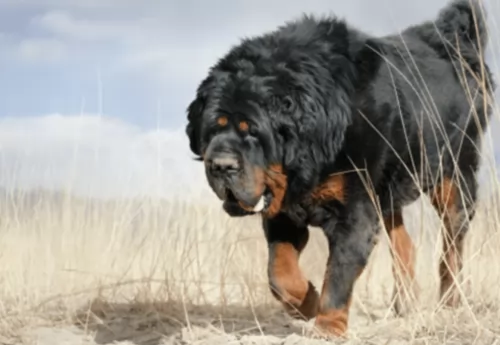 The Gaddi Kutta is mountain dog of the mastiff line from northern India. They are mostly found in the western Himalayas and Himachal Pradesh. It is also seen in Nepal and often named the Indian Panther Hound and the Mahidant Mastiff. They were bred to hunt but because of their strength and intelligence they are used to guard and herd goats and sheep. They are strong enough to defeat or scare off a panther or snow leopard and intelligent enough to work independently in finding strays and bringing them back to their pens. They have been known to protect herds of cattle from bears and leopards.3 or 4 of them working together can handle the guard duties for thousands of cattle.
The Gaddi Kutta is mountain dog of the mastiff line from northern India. They are mostly found in the western Himalayas and Himachal Pradesh. It is also seen in Nepal and often named the Indian Panther Hound and the Mahidant Mastiff. They were bred to hunt but because of their strength and intelligence they are used to guard and herd goats and sheep. They are strong enough to defeat or scare off a panther or snow leopard and intelligent enough to work independently in finding strays and bringing them back to their pens. They have been known to protect herds of cattle from bears and leopards.3 or 4 of them working together can handle the guard duties for thousands of cattle.
Their reputation precedes them – as ferocious and courageous, unmatched in their instincts to protect what is theirs. In the line of the Mastiffs and Molosser, the Gaddi is powerful and agile, and considered to be of ancient heritage though no one is sure what their origin is. The local myth is that dogs were crossed with tigers. It is more likely that dingo-like wild hounds from the Himalaya were crossed with the Tibetan Mastiff to create the Gaddi Kutti. Also found in Pakistan, most lines of the breed have been crossed with others including the German Shepard and the Bully Kutta. Outside of the Himalayas there are not many if any pure lines. The Gaddi Kutta is a good family dog if you socialize him as a puppy. He will be gentle, calm and intuitive with his family, but aggressive toward strangers and other dogs.
 The Central Asian Shepherd is a large dog, standing at up to 70cm in height and weighing in the region of 50kg. The dog is powerfully built and muscular, with the tail being traditionally docked to a short bob. Undocked, the tail is naturally long, thick at the base and tapering down. When relaxed, the tail is carried low, but when he becomes alert and excited, the tail is up and curved.
The Central Asian Shepherd is a large dog, standing at up to 70cm in height and weighing in the region of 50kg. The dog is powerfully built and muscular, with the tail being traditionally docked to a short bob. Undocked, the tail is naturally long, thick at the base and tapering down. When relaxed, the tail is carried low, but when he becomes alert and excited, the tail is up and curved.
The ears of this dog are also traditionally cropped close to the head so that the dog almost appears to have no visible ears. This practice is also falling away and the natural ears of this breed are small and set at- or below eye level.
The brown eyes are small to medium size and are deep set. The Central Asian Shepherd Dog is double-coated with short to medium length hair and can be found in quite a few different colors such as tan, white, black, grey, brindle, ticked or a blend of these colors.
You have to be careful about where you buy your Asian Shepherd from as these dogs can be prone to aggression. With good breeding however, the dog is evenly tempered. As a first time dog owner, this shouldn’t be your first choice as it is a dominant, wilful, territorial, independent dog who will require a tough, firm, strong owner. Training and socialization are imperative to ensure he becomes obedient. He is then capable of forming close and strong bonds with his master, becoming a loyal and devoted pet. He also makes an excellent guard dog.
He is a protective dog breed, and once trained can get on well with children and other pets. He is the kind of dog that you will want to supervise around small children.
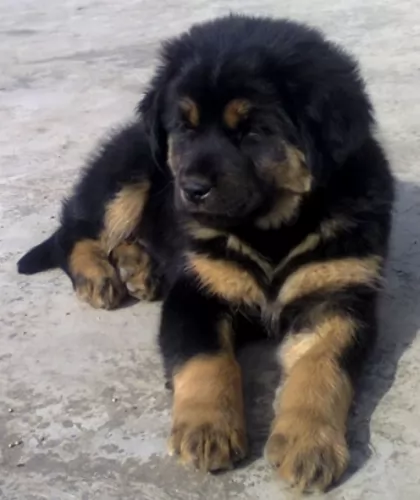 The Gaddi Kutta is a mastiff but he is athletic, has tremendous speed and stamina. He is muscular and deep-chested, leaner than most of the mastiff lines. Their ears can be either natural or cropped, on a very large head. One of the most important traits of the Gaddi Kutta is the massive, arched neck that protects them from predators. He is sturdy with a heavily feathered, thick tail curling over the back.
The Gaddi Kutta is a mastiff but he is athletic, has tremendous speed and stamina. He is muscular and deep-chested, leaner than most of the mastiff lines. Their ears can be either natural or cropped, on a very large head. One of the most important traits of the Gaddi Kutta is the massive, arched neck that protects them from predators. He is sturdy with a heavily feathered, thick tail curling over the back.
They are massive, wolf like dogs, fiery and huge but intelligent and faithful to their people. They are scary even when they are trying to be affectionate. The muzzle is strong, and the mane is thick. The Gaddi has long, heavy legs and very large feet that are feathered, making him even more intimidating.
There are two types of Gaddi Kutti – the longhaired and the shorthaired. The longhaired is the most common and has a fuller coat with long feathering on the tail, legs and chest and some feathering on the feet. They are all usually solid colors of yellow, fawn and cream or they could be piebald, brown or brindle. They have a woolly dense undercoat.
 It is important for those interested in the Central Asian Shepherd Dog as a pet to do some research on the breed. For instance this is a large dog that has been used for fighting.
It is important for those interested in the Central Asian Shepherd Dog as a pet to do some research on the breed. For instance this is a large dog that has been used for fighting.
While he can’t be described as being overly aggressive, you do need to be aware of his history, especially when you have small children in the home.
This dog is intelligent and confident too while also being exceptionally protective, and therefore he makes a good watchdog.
It is essential to have your Central Asian trained and socialized, and then he becomes far more relaxed and obedient, making him a loyal, loving guardian and friend.
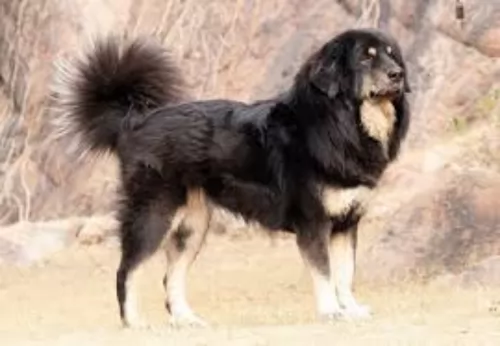 They are not always great with children, but they will protect own children in their family. Do not leave unattended.
They are not always great with children, but they will protect own children in their family. Do not leave unattended.
They have the ability to bring down a wolf or even a bear or snow leopard.
Because of his size, temperament and coat he is not very adaptable. He is good outside in a colder region and with a lot of land to roam, but not in a hot region or in an apartment.
This breed is very smart, learns quickly on his own.
 The Central Asian Shepherd doesn't have any hereditary ailments and he is generally a healthy, robust breed.
The Central Asian Shepherd doesn't have any hereditary ailments and he is generally a healthy, robust breed.
Large breeds are always prone to hip- and elbow dysplasia, an abnormal development of hip and elbow, brought about by a number of factors such as genetics, the wrong diet and rapid growth with some large puppies.
A dysplastic hip or elbow doesn’t move smoothly as it should, and this results in joint inflammation and pain. Symptoms can include loss of muscle mass, pain when moving around and difficulty with standing up again once your pet lies down.
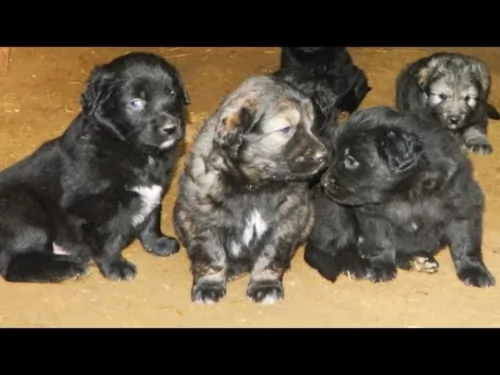 The breed is prone to obesity if they do not get enough exercise or a decent diet.
The breed is prone to obesity if they do not get enough exercise or a decent diet.
 Central Asians are large dogs and when he is looked after well he can reach up to 15 years of age.
Central Asians are large dogs and when he is looked after well he can reach up to 15 years of age.
It is important to see that he receives top quality, size-specific food, of which he eats a lot, and that it has all the vitamins and minerals he needs for his size.
A puppy will need high energy foods because of their energy. As he grows bigger, protein will become imperative. It is always a treat for your pet to add in some brown rice, vegetables and cooked chicken into his kibble from time to time.
Raw meat can be expensive, but if you can, it is important to ensure that your large pet gets some raw meat into his diet too, to keep his skin and coat healthy and to ward off disease. Make sure he has non-stop access to a bowl of fresh, cool water.
As previously mentioned, the coat of the Central Asian Shepherd can be fairly short but it can also be medium length. He isn't going to require any exceptional grooming but you will certainly need to give him a good brush twice a week, more so in his shedding periods. This will rid him of loose hair and keep his coat free of tangles and matting.
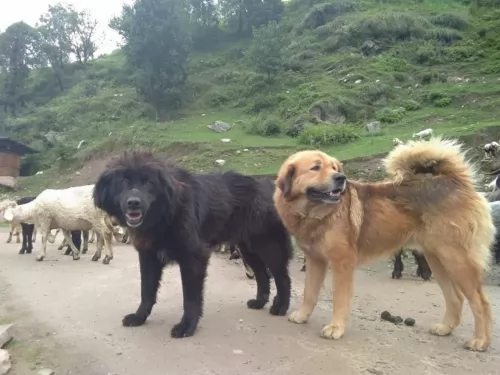 Should feed a high quality dry puppy food for large dogs. Give 1-2 cups per day split into 2-3 meals.
Should feed a high quality dry puppy food for large dogs. Give 1-2 cups per day split into 2-3 meals.
Again you want to feed high quality dry adult dog food for large dogs. Give 3-4 cups per day split into 2 meals. Watch for obesity and if your Gaddi Kutta is gaining too much weight, cut back.
The Gaddi Kutti seems to be immune to the most common of canine diseases.
This is a breed of very large dogs that need daily exercise by walking and running. However, since they have been fairly isolated in India and the Himalayas, he has not been exposed to organized dog play and exercise such as agility, dock jumping or field trials. He would probably succeed at all three.